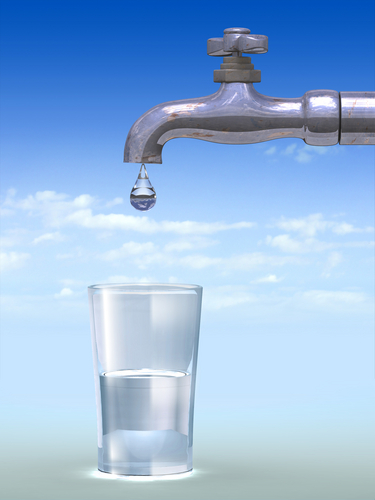Add a little dish-soap, the scientists advise.
Curious scientists solve dripping tap mystery
© Getty A dripping tap has been voted one of Britain's most annoying noises
It is a puzzle that has taken more than 100 years of research to solve and its source has kept thousands of people awake at night… what causes the "plink plink plink" noise of a dripping tap?
Now, curious scientists have identified what causes the noise and how to solve it.

Using cutting-edge video and audio recording technology, the noisy offender was discovered to be an air bubble that forms and vibrates when the droplet hits the water.
The latest hunt to find what was voted one of the twenty most annoying noises in Britain in 2016 began when Anurag Agarwal was being kept awake by the sound of a leak while staying at a friend's house.
"I was being kept awake by the sound of water falling in a bucket," the professor at the University of Cambridge recalled.
"The next day I discussed it with my friend and another visiting academic and we were all surprised that no one had actually answered the question of what causes the sound."
Using ultra-slow-motion video, a microphone and a hydrophone, the researchers were able to perceive details that had previously gone unnoticed.
An image published in 1908 in Arthur Mason Worthington's "A Study of Splashes" captured for the first time the moment a drop punctures a body of water's surface.
The image shows the formation of a cavity - like a thimble turned upside down - on the surface upon impact, followed by a column of water rising as the cavity recoils.
Around 1920, a team of researchers in England decided that resonance inside this cavity was the cause of the sound.
In 1955, another breakthrough was made. Scientists noticed the formation of a tiny bubble of air briefly trapped beneath the cavity as it took shape.
They wondered if the sound was made when this bubble burst.
Since then, dozens of published experiments with increasingly precise instruments backed up this idea.
"Until now, everyone thought these sound waves just passed through the water surface and that's how we heard the sound, much like if you hear someone speaking through a wall," said Samuel Phillips, an undergraduate student at the University of Cambridge and lead author of a study in Scientific Reports.
What Mr Phillips and his team found, was that the trapped air bubble vibrates as the cavity deepens.
"Sound waves emitted by the vibrating air bubble don't simply pass through the water surface into the air, as previously thought," Mr Phillips explained.
"Rather, the oscillating bubble causes the water surface itself to vibrate at the bottom of the cavity, acting like a piston to drive sound waves into the air."
And how to combat the noise until the leak can be fixed?
Add a little dish-soap, the scientists advise.
"It changes the surface tension of the water, and so prevents the bubble from being trapped under the water," Mr Phillips said.
"No bubble means no sound, hence no 'plink'!"
https://www.msn.com/en-ae/news/techands ... spartanntp